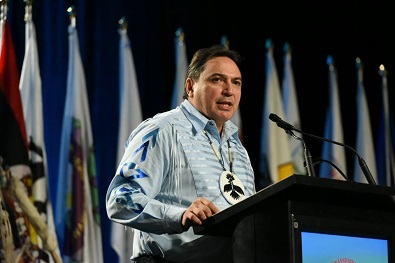Assembly of First Nations National Chief Perry Bellegarde.
The Assembly of First Nations say a recent national survey shows that a majority of Canadians support legislation to preserve and revitalize Indigenous languages.
The survey, conducted by Nanos Research, found that 74 per cent of Canadians support the creation of an Indigenous Languages Act. The most common reason given for this support was that language is important to culture and identity.
“It is important and encouraging that the majority of Canadians understand the need to promote and revitalize Indigenous languages,” says National Chief Perry Bellegarde in a release. “Under the Indian Act and through the residential schools, Canada deliberately tried to eradicate Indigenous languages. We must undo the damage done. Our languages are national treasures spoken nowhere else. They are a shared part of our history and an essential element of our right to self-determination. We can work together to support and strengthen our languages, and we must start now.”
Prime Minister Justin Trudeau told the AFN Special Chiefs Assembly in December that he would commit to co-developing an Indigenous Languages Act with Indigenous peoples to ensure the “preservation, protection, and revitalization of First Nations, Mtis, and Inuit languages in this country.”
The AFN says there are currently more than 50 Indigenous languages being spoken in Canada, but only three are predicted to survive unless there is drastic action.
“I want to hear our Elders whisper the ancient words of the ancestors into the ears of our babies,” says Bellegarde. “I want to see our young people speaking our languages on school playgrounds. To Indigenous people, wherever you are, I encourage you to seek out our fluent speakers and learn from them. Insist on your right to have your local languages taught in the schools systems and keep working at being able to speak your language.”
Today is National Aboriginal Languages Day. It was established by AFN Chiefs-in-Assembly in 1989 to build support across Canada for the preservation of Indigenous languages.
Nanos surveyed 1,000 Canadians, 18 years of age or older, between February 25th and 28th. The margin of error for a random survey of that size is 3.1 percentage points, 19 times out of 20.
